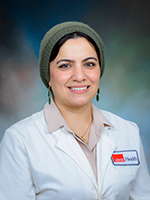The connection between the brain and the eyes is strong, with humans using about half of their brains for functions related to vision. Therefore, when problems occur within the brain or nervous system, it is not unusual for vision to be affected.
Neuro-ophthalmology involves the treatment of conditions affecting the nerve pathway between the eyes and the brain. UTMB’s Noor Laylani, MD, is among the subset of ophthalmologists specially trained in this realm. With this expertise, she enhances UTMB’s efforts to provide comprehensive care to patients with a variety of brain and nerve disorders.
“Every single disease that affects the body, be it systemic or neurological disease – if it impacts the eye, I'm going to take care of that condition, both in the terms of diagnosis and treatments,” Dr. Laylani says.
Originally from Iraq, where she completed medical school and her ophthalmology residency, Dr. Laylani found her passion for neuro-ophthalmology when she had the opportunity to train at Houston Methodist under Andrew Lee, MD, who is widely considered to be a leader in the field.
She admits she originally found the specialty to be intimidating, but with Dr. Lee as a mentor during her fellowship, she developed a deep appreciation for the important work at hand.
“I have had the opportunity to learn about complex neurologic cases – the complex cases where nobody else knew what was going on with them,” she says.
After her fellowship, she became faculty at Houston Methodist, practicing neuro-ophthalmology and general ophthalmology in both hospital and clinic settings. At UTMB, she looks forward to utilizing the full spectrum of her skills – including surgeries for simple tumors, cataracts, eyelid lesions, and trauma. She has extensive experience treating trauma from working in Iraq during wartime.
Neuro-ophthalmology cases might include different types of optic nerve disease, optic neuritis, ocular motility disorders, undiagnosed ocular toxicology, or Idiopathic intracranial hypertension (IIH). In some cases, Dr. Laylani says eye symptoms are the first sign of an underlying problem.
“In neuro-ophthalmology, we see a lot of conditions where we have to act fast because the patient’s life might be affected,” Dr. Laylani says.
This requires close collaboration with colleagues across specialties, mainly Neurology and Neurosurgery, as well as Radiology and others in Ophthalmology.
Being a crucial part of the interdisciplinary team that saves patients’ lives has proven to be one of the most rewarding aspects of work for Dr. Laylani, she says.
“This is the thing that touched me deeply and made me forget all about the tiredness that I felt last year when I was staying late at the hospital after hours, or dealing with difficult emergency cases,” she says.
“There are certain clues the eyes can give us, and that clue can lead to the diagnosis. I was doing that collaborative work, and I learned a lot from (the other physicians) – and they learned a lot from me too.”
 | Noor Laylani, MD, sees patients at the UTMB Eye Center locations in Galveston, Friendswood, and League City. Learn more about eye care at UTMB Health. |
